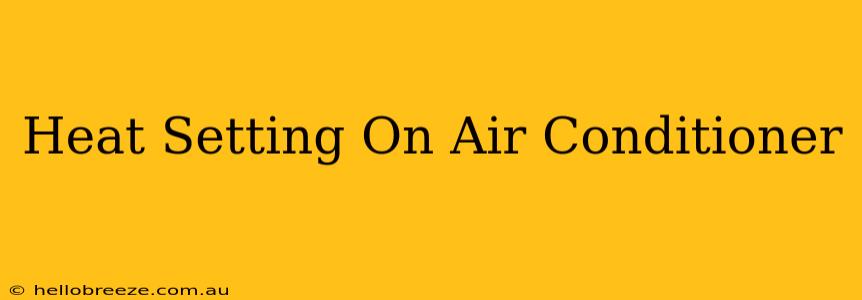So, you've got your air conditioner humming along, keeping you cool on a hot day. But what about those chillier evenings? Many modern air conditioners offer a heat setting – but how does it work, and is it the right choice for you? Let's dive into the details of using the heat setting on your air conditioner.
How Does Heat Mode on an AC Unit Work?
Unlike traditional heating systems that burn fuel (like gas or oil), your air conditioner's heat function utilizes a heat pump system. This clever technology essentially reverses the cooling process. Instead of drawing heat from inside your home and expelling it outside, it draws heat from outside and transfers it inside. This is often referred to as reverse-cycle air conditioning.
Key Differences from Traditional Heating:
- Energy Efficiency: Heat pump systems can be remarkably efficient, especially in mild climates. They often boast a higher Seasonal Energy Efficiency Ratio (SEER) than standard electric resistance heating.
- Environmental Impact: Because they don't burn fossil fuels, heat pump systems contribute less to carbon emissions compared to gas or oil heating.
- Operating Costs: While the initial investment might be slightly higher, the long-term operating costs can be lower, thanks to their efficiency.
- Comfort: The heat produced is often considered more consistent and comfortable than some other heating methods.
Is the Heat Setting on My AC Right for Me?
While convenient, using your air conditioner's heat setting isn't always the best option for everyone. Several factors influence its suitability:
Climate Considerations:
- Mild Climates: The heat pump system excels in regions with milder winters. In areas with consistently freezing temperatures, its efficiency drops significantly, and it might not be powerful enough to provide adequate heating.
- Extreme Cold: For areas with prolonged periods of extreme cold, supplementary heating is usually necessary. The heat pump might struggle to keep up, leading to higher energy bills and inadequate warmth.
Home Size and Insulation:
- Well-Insulated Homes: A well-insulated home will retain heat more effectively, making the air conditioner's heat setting more efficient.
- Larger Homes: Larger homes might require a more powerful heating system than a heat pump can provide, even in mild climates.
Optimizing Your Air Conditioner's Heat Performance
To get the most out of your air conditioner's heat function, consider these tips:
Regular Maintenance:
- Clean Filters: Regularly cleaning or replacing your air conditioner's filters ensures optimal airflow and efficiency.
- Professional Servicing: Schedule annual maintenance checks by a qualified technician to ensure your unit is operating at peak performance.
Temperature Settings:
- Smart Thermostats: Consider using a smart thermostat to program your heating schedule and optimize energy consumption.
- Gradual Temperature Changes: Avoid drastic temperature swings, as this can strain the system and reduce efficiency.
Making the Right Choice
Ultimately, the decision of whether to use your air conditioner's heat setting depends on your specific needs and climate. Weigh the pros and cons, consider your home's characteristics, and perhaps consult with an HVAC professional to determine the best heating solution for your home. Understanding the capabilities and limitations of your air conditioner's heat mode will help you make informed decisions to maximize comfort and energy efficiency.

